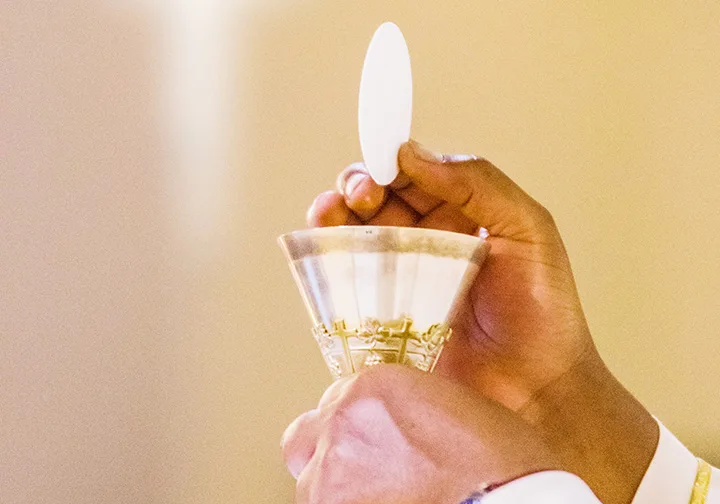
by Therese Horvat
Special to The Leaven
As the U.S. Catholic Church fosters eucharistic revival, this year’s observance of Holy Thursday presents the ideal opportunity to revisit and reaffirm our beliefs in this most holy sacrament.
We have it on good authority that Jesus Christ becomes really present — body, blood, soul and divinity — whenever and wherever Mass is offered and celebrated by consecrated ministers. Jesus’ words of institution of the Eucharist are recorded several places in the New Testament. One of the most familiar appears in St. Paul’s First Letter to the Corinthians:
“[T]he Lord Jesus, on the night he was handed over, took bread, and, after he had given thanks, broke it and said, ‘This is my body that is for you. Do this in remembrance of me.’ In the same way also the cup, after supper, saying, ‘This cup is the new covenant in my blood. Do this, as often as you drink it, in remembrance of me.’ For as often as you eat this bread and drink the cup, you proclaim the death of the Lord until he comes.” (11:23-26)
Add to these powerful words over 2,000 years of tradition and teachings professing belief in the Eucharist. This includes practices of the early Christians; doctrines promulgated by the official church and popes across the centuries; and interpretations and reflections of revered saints, scholars and theologians.
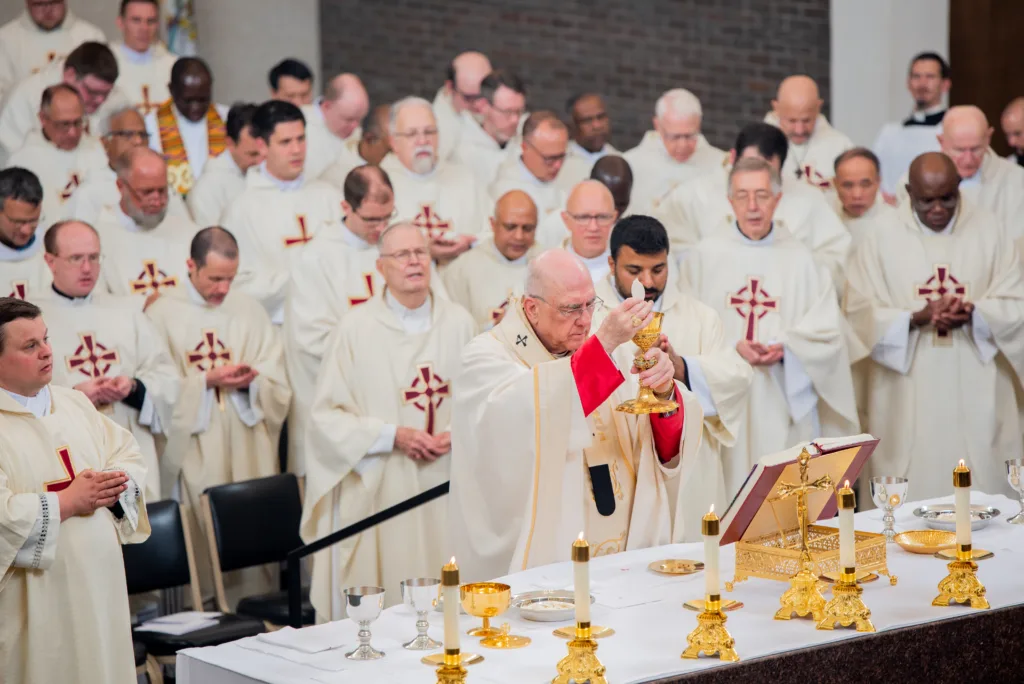
The Second Vatican Council and subsequent church documents elevate the Eucharist as the source and summit of the Christian life. The Eucharist remains a central mystery of our Catholic faith. While we may not be able to grasp its meaning totally and rationally, we are called to believe wholeheartedly in faith.
Our beliefs
We believe first and foremost that during the consecration of the Mass, the bread and wine actually become the body and blood of Jesus Christ through the power of the Holy Spirit and the instrumentality of the bishop or priest (U.S. Conference of Catholic Bishops). The celebrant speaks in the person of Christ; the Holy Spirit effects the change.
Theologically, this transformation is called “transubstantiation.” The substance of the bread and wine is changed while their outward appearance remains the same. Jesus is substantially present in a way that is entirely unique (“United States Catholic Catechism for Adults”).
The Eucharist is neither a symbol nor just a recollection of past events. It re-presents (makes present) Christ’s ultimate sacrifice of himself in love. It is at once both efficacious and salvific. That is, the words of the eucharistic prayer accomplish what they say is occurring. The bread and wine become Jesus Christ in this dynamic, perpetual, living memorial.
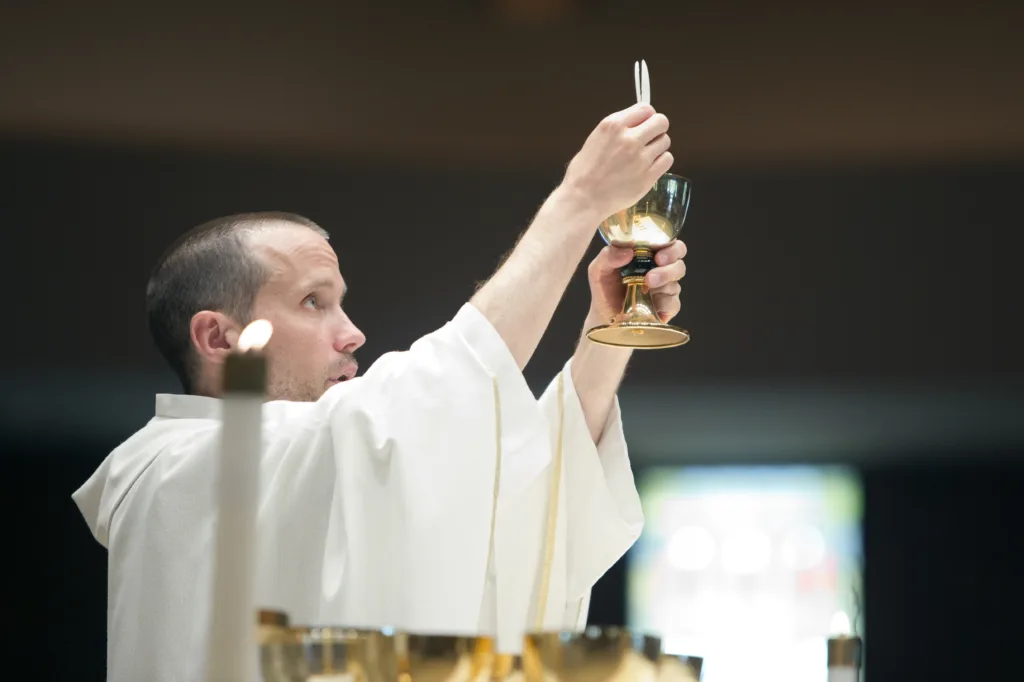
Not only does the Eucharist commemorate the Last Supper observed annually on Holy Thursday. Celebration of the Eucharist encompasses all that Christ did for our salvation throughout his ministry, crucifixion, death, resurrection and ascension. The Eucharist has redemptive power. The Eucharist makes present in a sacramental manner the sacrifice of Christ on the cross and his victory over sin and death out of love for us (Catechism of the Catholic Church). At each eucharistic celebration, we relive this paschal mystery with Christ, the celebrant and the entire congregation.
Life-altering effects
Reborn to Christ in baptism, Jesus sustains and nourishes us as we partake worthily in the Eucharist. We receive grace to imitate the love Christ shows us and to reshape our lives accordingly. Jesus gifts us with the offer to transform us into himself. We are drawn into the perfect love the sacrament offers. At the end of the Mass, the celebrant proclaims a eucharistic challenge: “Go in peace, glorifying the Lord by your life.”
In other words, “Go be Christ to everyone you meet, especially those in need.” We are invited to express our affirmation by saying, “Thanks be to God.”
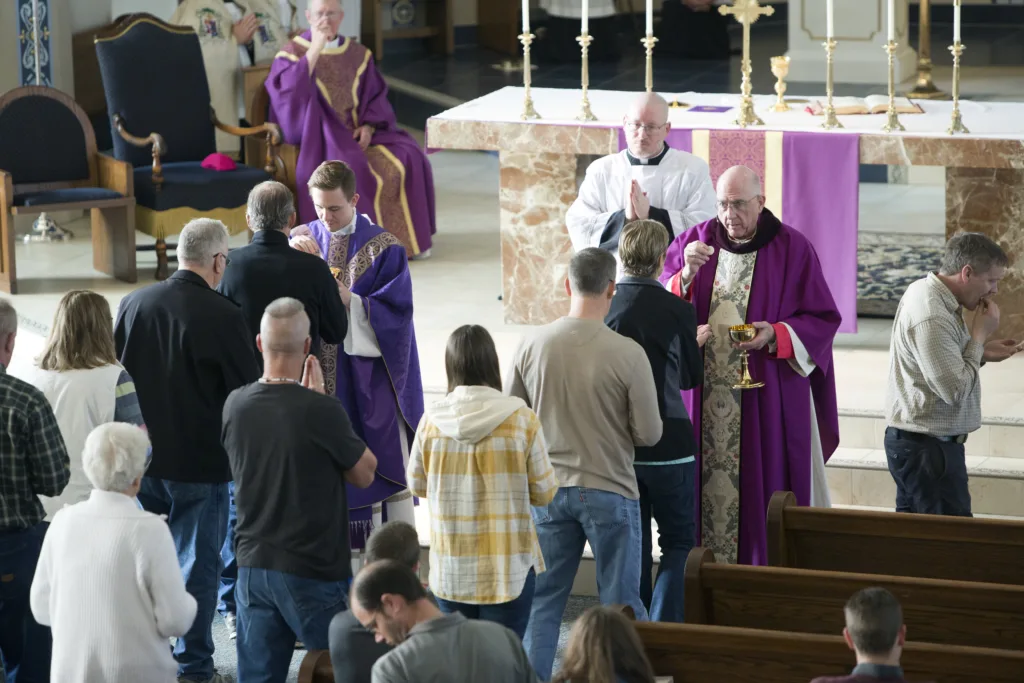
A prayer in a past edition of the catechism conveys the intention of this eucharistic spirit:
“Lord, take me. Bless me. Break me. Make me a part of your saving, sacrificial gift for the world’s bodily and spiritual needs.”
Instead of being perceived as a weekly obligation, celebration of the eucharistic liturgy and receiving Christ in the sacrament of the Eucharist become a blessed and grace-filled opportunity. This intimate union with Christ strengthens us to be virtuous and charitable. It unites us with the universal church and all the faithful across the centuries and across the world. The Catholic Church teaches that the joy of receiving the Eucharist is a foretaste of the final banquet and heavenly glory we anticipate.
The mystery remains
If the sacrament of the Eucharist seems mind-boggling, highly regarded and respected theologians offer words of wisdom. Thomas Aquinas, the great scholar-saint of the Middle Ages, and the late Pope Benedict XVI both acknowledge the Eucharist as a mystery. Aquinas writes that the meaning of the Eucharist cannot be apprehended by the senses, but rather only by faith that relies on divine authority. Pope Benedict describes the Eucharist as a mystery to be believed, celebrated and lived.
On Holy Thursday and continuing through this time of eucharistic revival and beyond, let us be in awe at the mystery of the Eucharist. In good faith, let Christ take the lead as he did at the Last Supper, on Calvary and on the road to Emmaus. Let us recognize and receive him in the breaking of the bread and allow his eucharistic love to fill us with Alleluia joy.





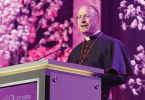

Aside from the implied false dichotomy concern symbol and Real Presence, this is a wonderful article presenting the full Eucharistic economy, extending to ecclesial mission.
It isn’t quite accurate to say the Eucharist isn’t a symbol. A more nuanced discussion of this topic can be found in Brett Salkeld’s book, “Transubstantiation.” Salkeld is diocesan theologian in Regina, Saskatchewan. Summaries of his argument:
https://praytellblog.com/index.php/2021/06/01/real-presence-and-polarization/
https://praytellblog.com/index.php/2021/06/23/real-presence-and-ecumenism/
https://praytellblog.com/index.php/2021/09/11/real-presence-and-idolatry/
https://praytellblog.com/index.php/2021/11/09/real-presence-and-mission/